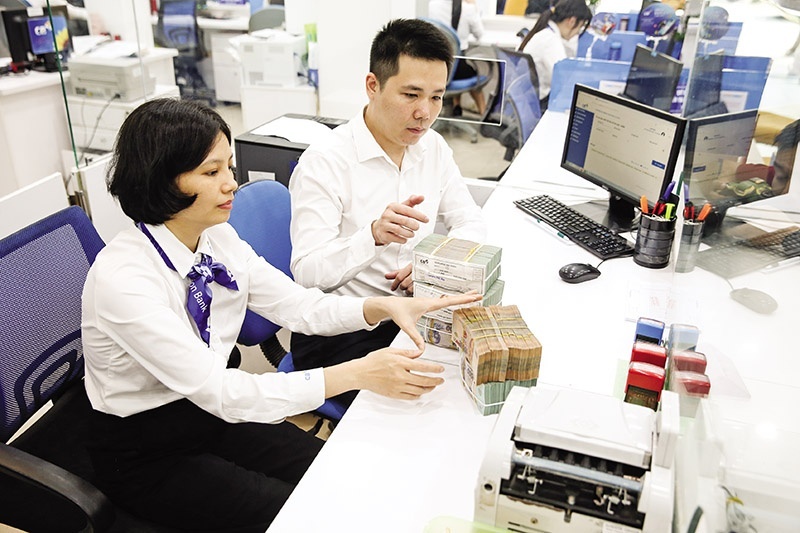Straight from the horse’s mouth: says leading economic experts’ online seminar

According to VIR’s Editor in Chief Dr. Nguyen Anh Tuan, the local market has been strongly affected by international economic volatilities recently, including the crash of the Chinese stock market, the ups and downs of the Dow Jones, Frankfurt’s DAX and other stock exchanges’ trading sessions, together with the Yuan devaluation and the plunge in world oil prices.
“In order to provide investors with trustworthy information and professional analysis, VIR finds it essential to organise the event which directly connects listed firms’ representatives and financial experts,” said Tuan.
|
In my opinion, the Vietnamese stock market still holds the potential to grow well in the coming fourth quarter due to the positive macro-economic prospects and businesses’ profit. Vietnam’s macro-economy is showing positive signs with the estimated growth rate around 6.4 per cent – 6.5 per cent and low inflation rates this year. Regarding the foreign exchange rate, despite the fact that the dong has been devalued by 5 per cent against the US dollar since the beginning of the year, the decrease is still much lower than other regional currencies. Besides, the stabilised interest rates will support businesses’ profit plans. The profit is estimated to be 13 – 15 per cent higher than the previous year, according to our analyses. Also, Vietnam’s tickers are currently valued much lower than other markets in the region, as mirrored by the Price-to-Earnings Ratio (P/E), which is at a low of 10.8, in comparison with Thailand’s 17, the Phillippines’ 19 and Indonesia’s 23. That is to say, investors should have long-term vision, instead of being led astray by short-term ups and downs. In particular, investment plans should focus on codes with good business results, or codes enjoying lingers from the foreign ownership cap removal policy and the oil price plunge. |
|
Anticipating these global movements, the SBV has adjusted both the inter-bank rate and the trading band to eliminate negative effects on the Vietnamese market, which, in my view, is enough to counter the volatilities even in early 2016. After that, the SBV chose to sell some of its US dollar reserves, among other moves, to stabilisethe forex and foreign currency markets. Regarding further volatilities in the time to come, SBV will continue selling its foreign reserves if needed, in addition to implementing other policies and adjusting regulations on inter-bank interest rates or on foreign currency transactions. These target lifting market liquidity, reducing pressure from both the demand and the supply side of the market”. |
|
Currently, fluctuations in the Chinese stock market have the largest impact on markets all over the world, including Vietnam. The Shanghai Composite crash will take its toll on the world’s second largest economy by reducing the aggregate demand, hence affecting global production and economic growth. The FED’s intention to raise interest rates has been reflected in the market behaviour since the end of 2013. Firstly, macro-economic policy adjustments have taken into account the possibility of a lift, with the forex rate policy as an example. Secondly, most of the investment funds by far have come up with portfolio restructuring methods/alternatives to avoid risks. In conclusion, such a move by the FED with raising margin equal to or less than 0.5 per cent would not pose a significant impact on the Vietnamese stock market”. |
What the stars mean:
★ Poor ★ ★ Promising ★★★ Good ★★★★ Very good ★★★★★ Exceptional
Latest News
More News
- The promotion of ESG via banking (November 21, 2024 | 09:32)
- Standard Chartered committed to Vietnam’s financial success (November 21, 2024 | 09:24)
- Full ESG adoption the priority for Agribank (November 21, 2024 | 09:07)
- Banks entice youth with tech advances (November 21, 2024 | 08:00)
- Banks shaping the future as business advisors (November 20, 2024 | 21:00)
- ESG represents a shift towards sustainability for banks (November 20, 2024 | 13:00)
- GGGI supports Vietcombank’s debut of $80 million green bonds (November 20, 2024 | 11:20)
- SHB and the ESG journey: creating social value in every step (November 19, 2024 | 15:00)
- Banking sector contributes to ESG, green growth, and sustainable development (November 19, 2024 | 14:42)
- ESG implementation in banking: from awareness to action (November 19, 2024 | 12:08)




 Hoang Cong Tuan, senior analyst, Military Bank Securities Company
Hoang Cong Tuan, senior analyst, Military Bank Securities Company Bui Quoc Dung, general director of the Monetary Policy Department under the State Bank of Vietnam.
Bui Quoc Dung, general director of the Monetary Policy Department under the State Bank of Vietnam. Nguyen Xuan Binh, deputy head of Research at Bao Viet Securities Company
Nguyen Xuan Binh, deputy head of Research at Bao Viet Securities Company












 Mobile Version
Mobile Version